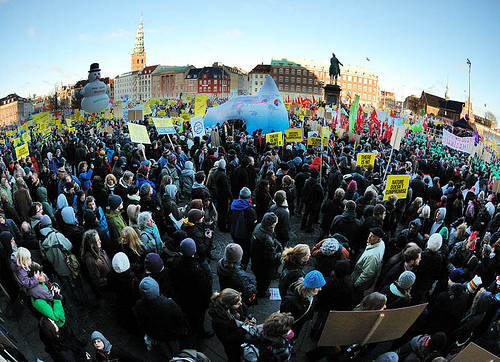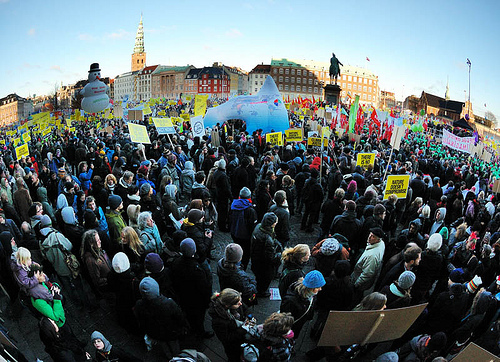 While reporters were busy writing about the violence in Copenhagen they missed the alive spirit that came from the world’s citizens gathered to fight climate change. Photo: Greenpeace Finland via FlickrJust off the plane from Copenhagen, little sleep under my belt, I’m full of ideas for how to ratchet up the climate movement, big time. Over a late-night beer this week, Jessy Tolkan, coordinator of Energy Action, perfectly captured what we have to do. For the moment, I’m calling it 10X.
While reporters were busy writing about the violence in Copenhagen they missed the alive spirit that came from the world’s citizens gathered to fight climate change. Photo: Greenpeace Finland via FlickrJust off the plane from Copenhagen, little sleep under my belt, I’m full of ideas for how to ratchet up the climate movement, big time. Over a late-night beer this week, Jessy Tolkan, coordinator of Energy Action, perfectly captured what we have to do. For the moment, I’m calling it 10X.
A quote from Jessy — shared below — explains the name; let me first share some background.
As the COP15 negotiations intensified during their second week, civil society leaders took words and action to a new level. And it wasn’t just the familiar rituals (on cue: ‘This is what democracy looks like!’) that have characterized every official U.N. climate negotiation since who knows when. The mainstream press documented some of that good stuff and way too much bad stuff: billy clubs + street protests = story that writes itself.
Not only did too many bigwig reporters fall back on that tired storyline. They seemed blind to something new that was afoot, something that’s hard to convey: how alive, how diverse, how forceful and beautiful really the world’s citizens can be when they assemble — particulary those dedicated to our grand fight against global warming
Walking through the U.N.’s Bella Center and the sprawling scene in Copenhagen, this is what I bore witness to (check out these photos too.) Tens of thousands of citizens, in traditional clothing and formalwear (a 350 tie brought status!), armed with drums and laptops, connecting by passing out business cards and texting, becoming instant allies. Collectively they had a presence that was transcendent. In every available corner of the city, they strategized and organized flash mobs, sang hymns and delivered petitions, cried and got really pissed off and found time to laugh. As Paul Hawken so keenly documents in Blessed Unrest, civil society of the 21st century is a Gaia-like organism. In Copenhagen, connected by both wireless and trust — and despite the callous incompetence of the COP organizers — it blossomed.
Now the stage is set for Jessy. Early in COP15’s second week, she and another ten distinguished leaders — this decade’s Diane Nash’s and John Lewis’s — arranged a meeting with a high-level member of the U.S. delegation. By their account, it was highly-charged, emotional, and as frustrating as any 30 minutes they have ever experienced. Behind closed doors, they witnessed what Bill McKibben and 350.org — incomparable leaders — were to discover so strikingly two days later; COP negotiators knew all along that their draft plan was nowhere near a trajectory to get to 350. And as the meeting ended, the official seemed to twist the knife when he looked at them and declared: “You haven’t done enough. You haven’t built the popular support that we need to get behind something like a 350 trajectory”.
But after some outrage and some tears, these inspiring leaders did what they have always done since the climate movement began to coalesce seven years ago. They vowed to work even harder, as hard as humanly possible, testing new ideas and mobilizing new resources, to win this fight of the ages.
Here’s Jesse’s money quote later that night, as a handful of us debriefed: “Never again am I going to sit in the room with an elected official and be told that our movement isn’t strong enough. I’m going to go home and do my part to make it ten times as big.” In other words, it’s time for 10X.
As I write this, listening live to the last proclamations coming out of COP15’s exhusted plenary (the Algerian minister noted that he hasn’t slept for 52 hours!), I’m not smart enough to know if the UNFCCC has produced a ‘good‘ Copenhagen Accord. (Many NGOs, as the closing gavel now comes down, believe that it’s a disaster.) And I certainly don’t have a clue as to what transformative international arrangements will be needed, ASAP, to help us to really ‘begin the world anew.’ All that is for another day.
But I do know two things. I like the idea announced by Al Gore early in the week that we set Earth Day 2010 as the deadline for bold action on climate change in the U.S. For even the frailest international intention will vanish if the U.S. Congress doesn’t act. (And Obama, I still love you, but you’ve gotta lead on this one. The lame pending health care bill shows what happens if you don’t go all FDR-after-Pearl-Harbor.) And I know that Jessy in right: it’s time for 10X. If you are a U.S.-based climate warrior, do nothing but work you butt off over the next 125 days to get a world-changing bill
And indeed, that’s what I felt coming to life in the last hours of COP15, among our own particularly American civic Gaia, the globally-wired but U.S.-based warriors here for over a fortnight: green groups in their war room; 1Sky, Energy Action, and Focus the Nation; Climate Project volunteers; hip new app-driven groups like the Alliance for Climate Education and Kids vs. Global Warming; foundation heads.
And yet these and other American leaders now boarding flights out of Denmark are not the most important players in all of this over the next 125 days. Who must lead an unstoppable groundswell, in all fifty states, to force our elected leaders to follow game-changing precedents like the Civil Rights Acts of 1964 and 1965? Americans. Americans in their churches, synagogues and mosques; in girl scout groups and small-town business groups; in informal social networks that bless our daily lives. It is the hearts and hard work of those who have been home all along that must comprise an unstoppable groundswell — in all fifty states, the District of Columbia, and the Territories.
And again, this is why the Earth Day analogy is good. In creative and crazy and app-driven ways that leaders are cooking up right now, we must spark not only a multi-million person celebration of who we are and what we do: we must make our leaders understand that this too is a transcendent moment. Indeed, listen up: over the next few weeks, every time an inside-the-beltway type nods sagely that global warming legislation may have to be delayed due to the legislative calendar (blah blah blah), we’d better be able to say to them: “No. This is our time. This one can’t wait. This is what Americans want, now.” Mentally bookmark the conversation that Jessy and her colleagues had earlier in the week: this is what we must be able to say.
So pour more coffee. Gather friends and family in the kitchen. Work the IPhone. Fire up your block associations and classrooms. Schmooze your influential old friend. Write a letter a day to your local paper; call your senators’ and rep’s offices once a day. Find respected local political players in your state who are on our side and ask ‘How can I help?’ And enjoy this exhilarating four-month ride.
Until April 22, go 10x.
Spread the news on what the føck is going on in Copenhagen with friends via email, Facebook, Twitter, or smoke signals.






